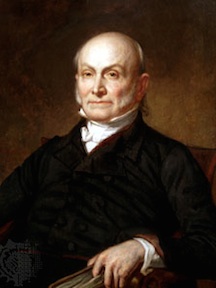By Samantha Yates
John Quincy Adams, sixth President of the United States, is not particularly remembered or celebrated in American history. At best, he is remembered for being the son of John Adams, at worst, for losing a contested and publicly scrutinized election to Andrew Jackson. But John Quincy Adams deserves far more recognition for his true dedication to public service and should be remembered as one of Phi Beta Kappa’s most prestigious members.
A scholar from a very young age, Adams had the opportunity to study in France in his early teens. He also attended the University of Lieden in London and graduated in 1787 from Harvard, where he became a member of Phi Beta Kappa. He studied languages, literature, history, and a plethora of other topics, but his heart was in literature. As quoted in Fred Kaplan’s John Quincy Adams: American Visionary (2014), Adams once said: “Literature has been the charm of my life, and could I have carved out my own fortunes, to literature would my whole life have been devoted. I have been a lawyer for bread, and a Statesman at the call of my Country.” Clearly, his devotion to learning and vested interest in different disciplines made Adams an exemplary Phi Beta Kappa member and arguably an excellent candidate for the presidency.
Adams served as a lawyer, a United States ambassador (to Germany, Great Britain, and Russia), a senator, a member of the House of Representatives, Secretary of State and the sixth President of the United States. His talent for critical thinking and persuasion was evident in the countless treaties he negotiated. Recently, scholars have proposed that Adams might be the founder of American foreign policy realism, perhaps one of the best examples of his influence in this field. In addition to his skills as a negotiator, he is described by Kaplan as “semi-independent,” because, although officially affiliated with the Federalist Party, he was well respected by and had respect for members of the Republican party. He was even offered positions of prestige by Republicans in recognition of his ability to work across the aisle. It is difficult to imagine such an independent in our hyper-partisan era. Someone who is able to critically evaluate and truly embrace policies that work towards the greater good, rather than getting caught up in partisanship, is an extremely valuable individual in any field, but particularly in government. Adams was one such rare individual.
It is Adams’ achievements and impressive political skills that that make him such a prestigious member of Phi Beta Kappa, but his dedication is unparalleled. His election to the presidency was overshadowed by a Congress committed to blocking his suggested programs and actions. He was voted out of a second term and succeeded by Andrew Jackson. Yet Adams did not take this defeat and give up his principles of working in public service. He is the only president to have served in Congress after his term as president—a testament to his true desire for public good. He worked tirelessly to end rules that he found immoral, such as a gag rule passed to prohibit any congressional discussion against slavery, which he succeeded in overturning after eight years of arguing. He cared more for his service than for his own health, and suffered a stroke in 1848, collapsing on the House floor and dying two days later.
While John Quincy Adams may never have received the recognition he deserved during his lifetime, today’s Phi Beta Kappa members, from any discipline, can appreciate one of their own—a person who embodied the virtues of critical thinking, widespread interest in a variety of topics, and commitment to the values inherent in the study of liberal arts and sciences that are essential to Democratic government.
Samantha Yates is a junior at McDaniel College majoring in English and minoring in economics. McDaniel College is home to the Delta of Maryland Chapter of Phi Beta Kappa.




